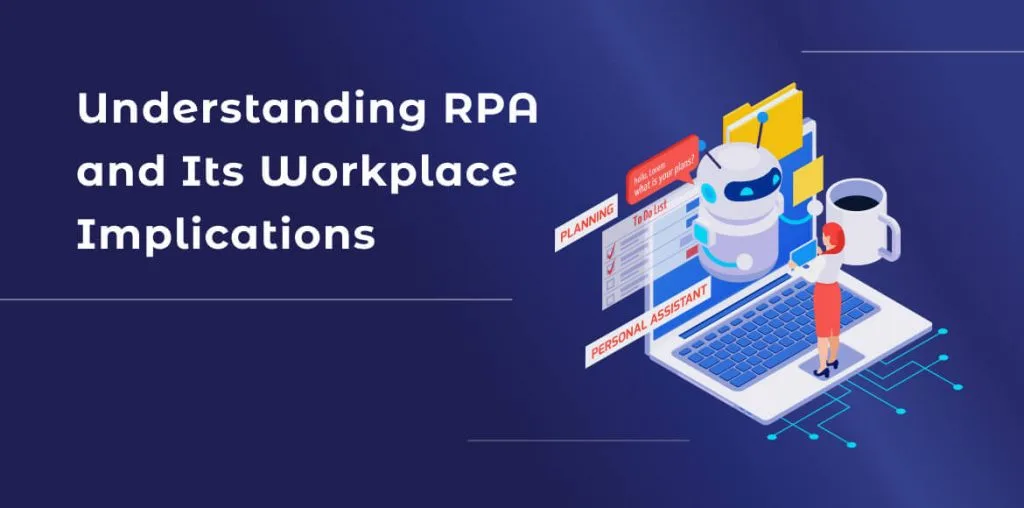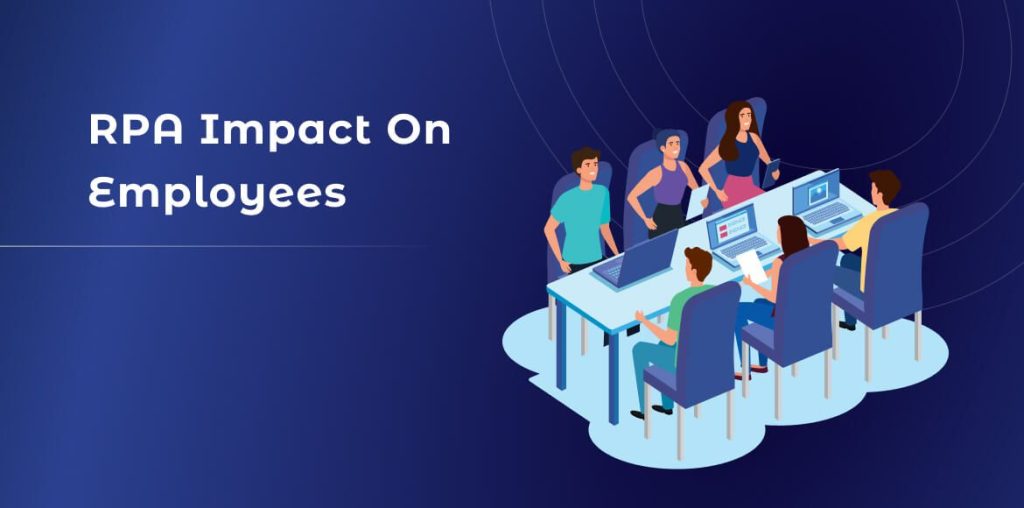With advancing technology, Robotic Process Automation (RPA) is reshaping job performance and employee engagement in evolving workplaces. RPA's shift to automating routine tasks has various psychological impacts on the workforce. This article explores RPA's effects on employee morale and job satisfaction, highlighting how automation can foster a positive work environment.
Understanding RPA and Its Workplace Implications
Robotic Process Automation (RPA) is a major technological leap, transforming business operations and employee interactions. At its core, RPA involves the use of software bots to automate repetitive and routine tasks that were traditionally performed by humans. These bots are capable of mimicking human actions within digital systems, efficiently executing a wide range of processes from data entry to complex transaction handling.
The implications of RPA in the workplace are profound and multifaceted. On one hand, it introduces remarkable efficiency and productivity gains, allowing businesses to streamline operations and reduce the time spent on mundane tasks. On the other hand, the introduction of RPA brings about a shift in the workforce dynamics. It challenges traditional job roles and demands a new set of skills from employees, who must now learn to coexist and collaborate with digital coworkers.
This transition to an RPA-enhanced workplace also has significant psychological impacts on employees. While it can lead to increased job satisfaction and morale due to the reduction of tedious tasks, it can also create apprehension and uncertainty, particularly around job security and the changing nature of work. Employees may feel anxious about the need to adapt to new technologies or concerned about the potential of being replaced by automation.
Understanding RPA's workplace implications involves recognizing its operational benefits and addressing the human element. It involves preparing the workforce for change, reskilling employees for new roles that emerge in an automated environment, and fostering a culture where technology and human talent work in synergy to achieve business goals.

RPA Impact on Employees
The integration of RPA within the workplace has a profound psychological impact on employees. While it's often lauded for its efficiency and cost-saving benefits, the human side of the equation must not be overlooked. The fear of job displacement can loom large, potentially leading to decreased morale. However, when managed with a focus on RPA and employee engagement, the technology can alleviate stress by reducing mundane tasks and allowing employees to focus on more strategic and fulfilling work (Smith, 2021).
Alleviating Monotony, Enhancing Focus
One of the primary impacts of RPA is the alleviation of monotony in the workplace. By taking over repetitive and time-consuming tasks, RPA allows employees to redirect their focus toward more engaging and strategic work. This shift can lead to increased job satisfaction, as employees find more value and meaning in their roles, engaging in tasks that require creativity, critical thinking, and problem-solving skills.
Job Security Concerns and the Need for Adaptation
Despite these benefits, the introduction of RPA can also generate concerns about job security among employees. The fear that automation may replace human jobs can create anxiety and uncertainty. This aspect of RPA necessitates a thoughtful approach from management, emphasizing the importance of human skills and the opportunities for upskilling and reskilling in the evolving workplace.
Opportunities for Professional Growth
RPA also presents opportunities for professional growth and development. As routine tasks are automated, new roles that focus on managing, optimizing, and working alongside RPA systems emerge. Employees have the chance to develop new skills, particularly in areas like process management, data analysis, and RPA technology itself, paving the way for career advancement and a more dynamic work environment.
Cultural and Psychological Shifts
The integration of RPA into business processes also leads to cultural and psychological shifts within organizations. It requires employees to adapt to working alongside digital colleagues, fostering a culture of innovation and continuous learning. This cultural shift can enhance collaboration and creativity, but it also requires a supportive environment where employees feel valued and secure in their evolving roles.

RPA Job Transformation
The advent of RPA is not about replacing human jobs but transforming them. By automating routine and repetitive tasks, RPA allows employees to be reassigned to roles that utilize their human intelligence and emotional understanding. This shift is particularly evident in areas like strategic planning and customer interactions, where human insight is irreplaceable. Employees find themselves moving away from monotonous tasks to engaging in work that requires critical thinking, creativity, and interpersonal skills.
RPA in Enhancing Job Quality
RPA plays a significant role in enhancing the quality of jobs. By taking over the more tedious and mundane aspects of work, it opens up opportunities for employees to engage in tasks that are more creative and rewarding. This shift not only makes the work more interesting and engaging for employees but also adds more value to their roles within the organization. Employees can apply their unique skills and expertise in ways that truly matter, leading to greater job satisfaction and a sense of accomplishment.
Employee Productivity RPA
One of the most notable impacts of RPA is the increase in employee productivity. By automating time-consuming tasks, RPA frees up employees to focus on work that requires human insight and decision-making. This leads to a more efficient use of human resources, where employees can contribute more effectively to strategic and creative tasks. The result is not just an increase in the quantity of work done but also an improvement in the quality of outputs.
Overcoming RPA Adoption Barriers
Overcoming adoption barriers is crucial for organizations to fully benefit from RPA. These barriers often include resistance to change, a lack of understanding of the technology, and fears of job loss. Addressing these concerns involves clear communication, education, and reassurance about the role of RPA in the workplace. Organizations need to demonstrate how RPA can be a tool for empowerment and growth, rather than a threat to job security.
RPA and Human Interaction
Organizations can navigate this new terrain with resources and guidance from Scimus.

Wrapping Up: Embracing the Future of Work with RPA
As we reach the conclusion of our exploration into the psychological impact of Robotic Process Automation on employee morale and job satisfaction, it's clear that RPA is not just a technological advancement but a catalyst for profound workplace transformation. This journey through the multifaceted effects of RPA underscores the importance of balancing technology with human-centric approaches.
Organizations looking to navigate this new terrain can find valuable resources and expert guidance with Scimus. Our dedicated team at Scimus specializes in integrating RPA into diverse business environments, ensuring a seamless blend of efficiency and employee satisfaction.
Delve deeper into the world of RPA and its impact on the modern workplace by visiting the Scimus Blog. Here, you'll find a treasure trove of articles, case studies, and expert insights that will equip you with the knowledge to harness the full potential of RPA in your organization.
References
- Smith, J. (2021). The Human Side of Automation: RPA's Effect on Employee Morale. Journal of Business Technology.
- Johnson, L., & Marquez, J. (2020). Engagement in the Robotic Age: How RPA Affects Employee Satisfaction. Automation and Society Review.
- Dale, S. (2019). Maximizing Productivity: The Role of RPA in Modern Business. Efficiency Matters.
- Turner, A. (2022). From Fear to Empowerment: Transforming Jobs with RPA. Workforce Solutions.
- Harper, E. (2021). Enhancing Job Quality with Robotic Process Automation. Future of Work Journal.
- Bennett, K. (2020). Productivity in the Age of Automation: The Impact of RPA on Workforce Efficiency. Industrial Management.

